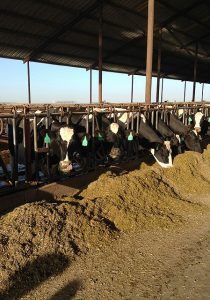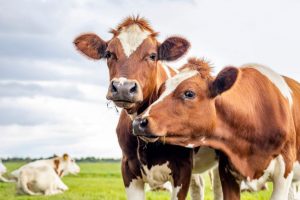Heat stress is a significant challenge for dairy farmers, particularly during hot seasons. High temperatures can negatively impact milk production, cow health, and overall farm efficiency.
1. Provide Adequate Shade
One of the simplest and most effective ways to prevent heat stress is by providing ample shade. Trees, shade cloths, and constructed shelters can offer relief from direct sunlight. Ensure that all cows have access to shaded areas throughout the day. Properly designed shelters should be well-ventilated to allow for air circulation, reducing the temperature within the shaded area. Shade not only helps lower body temperatures but also encourages cows to eat and drink more, maintaining their overall health.

2. Ensure Access to Clean, Cool Water
Hydration is critical for preventing heat stress in dairy cows. Ensure that cows have constant access to clean, cool water. During hot weather, cows’ water intake can increase significantly, so it’s essential to check water sources frequently and refill them as needed. Installing additional water troughs in shaded areas and using automatic waterers can help ensure an adequate supply. Cooling water sources, if possible, can further help in reducing cows’ body temperatures.

3. Improve Ventilation
Good ventilation is vital in barns and milking parlors to prevent heat buildup. Use fans, blowers, or misters to enhance air circulation and reduce temperatures. Position fans to create a consistent airflow over the cows, particularly in resting and feeding areas. High-volume, low-speed (HVLS) fans are particularly effective in larger barns. Combining fans with misting systems can significantly cool the air and provide relief from heat.

4. Optimize Feeding Practices
Feeding practices can influence cows’ heat stress levels. Cows generate more body heat during digestion, so adjusting feeding times to cooler parts of the day, such as early morning or late evening, can help minimize heat production. Ensure that feed is fresh and not spoiled, as heat can accelerate feed spoilage. Providing high-quality forage and balanced rations can help maintain cows’ energy levels and overall health during hot weather.

By the way you should Note that our company can help you to start by giving you all the necessary information you need to get started if not yet in the business. Please check our online shop, we have all the standard business proposals for different capacities at very a cheap price made by the best agricultural specialists as well as Standard design plans that are made by the best agricultural architects around the globe. please visit our online shop now using the links below to witness by yourself
Design plans (FARM HOUSE DESIGNS – Kimd Construction & Farm Consultants)
Business plans (BUSINESS PLANS & PROPOSALS – Kimd Construction & Farm Consultants)
Welcome back from visiting our shop, hope you have placed your order for any of our products or you can place it after navigating more of our informative articles.
So let’s continue with our article! In this blog article!
5. Monitor and Manage Cow Comfort
Closely monitoring cow behavior and comfort is essential during hot seasons. Look for signs of heat stress, such as increased breathing rate, excessive drooling, reduced feed intake, and decreased milk production. Implement measures like providing sand bedding, which retains less heat, and ensuring that resting areas are clean and dry. Pay extra attention to high-producing cows and those with a history of health issues, as they are more susceptible to heat stress.

6. Implement Cooling Systems
Advanced cooling systems can be highly effective in mitigating heat stress. Sprinkler systems that periodically wet the cows can help lower their body temperatures, especially when combined with fans. Use these systems in high-traffic areas, such as feeding and milking parlors, to maximize their cooling effect. Ensure that the cooling intervals are frequent enough to provide relief but not so frequent as to create muddy conditions, which can lead to other health issues.

7. Provide Nutritional Supplements
Consider providing nutritional supplements to help cows cope with heat stress. Electrolytes and specific vitamins and minerals can support cows’ hydration and metabolic processes during hot weather. Consult with a livestock nutritionist to determine the most appropriate supplements for your herd. Proper supplementation can help maintain milk production and cow health even under stressful conditions.

Conclusion
Preventing heat stress in dairy cows during hot seasons is essential for maintaining milk production, cow health, and overall farm efficiency. By providing adequate shade, ensuring access to clean, cool water, improving ventilation, optimizing feeding practices, monitoring cow comfort, implementing cooling systems, planning effectively, and providing nutritional supplements, farmers can mitigate the effects of heat stress. These proactive measures not only enhance cow welfare but also contribute to the long-term success and sustainability of the dairy farming operation.



